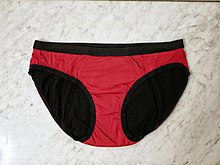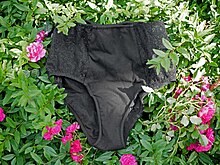Period underwear (also known as menstrual underwear or period panties) are absorbent garments designed to be worn during menstruation. Period underwear is designed like conventional underwear but it is made up of highly absorbent fabrics to soak up menstrual blood. Most commercially manufactured period underwear makes use of microfiber polyester fabric. It is recommended that period underwear should be changed every 8-12 hours to avoid leakage and infection.


Overview
editThe market for period underwear has developed as a response to consumer preference moving away from traditional menstrual hygiene management products, such as sanitary pads and tampons.[1] Different brands use different, often patented, technology for anti-microbial action, moisture-wicking[2] and optimal absorption.
Julie Sygiel[3] was cited by the BBC in 2015 as an early developer of the technology, with her company 'Dear Kate'.[4]
Period underwear is considered to be an eco-friendly way to cut down on waste[5] and reduce spending.[6] It is estimated that tampons, pads, and applicators, generates 200,000 tonnes of plastic waste in the United Kingdom each year.[7][8] In the United States it is estimated that sanitary products generate more than 200,000 tonnes of waste annually.[9]
A reviewer in the New York Times described the product's features: "some menstrual-underwear styles are gorgeous but leaky, and others have Hoover Dam–level security but diaper-like silhouettes. The style that will be best for you depends on your period flow and preferences".[10]
Some manufacturers of period underwear are extending their ranges into other leak-proof clothes such as swimsuits, sportwear and sleepwear.[11]
In the UK, period underwear was subject to value-added tax at 20% until 2024, despite the fact that other menstrual products were exempted from the tax in 2021.[12] The exemption for period underwear was brought in after tampon tax campaigners had raised the issue in an attempt to get the tax removed.[13]
Risks
editSome companies (like Thinx, Ruby Love, and Knix) are facing class action lawsuits[14] for period underwear products that contain potentially harmful toxins like per- and polyfluoroalkyl substances (PFAS) which may be linked to adverse health outcomes like cancer. Thinx settled a lawsuit in January 2023[15] but made no admission of guilt or wrongdoing in the settlement. Some brands of period underwear have been found to contain silver used as an antimicrobial agent. Concerns have been raised about the possible health impact of silver migrating into the body, but limited research has been done and little scientific data exists.[16]
See also
editReferences
edit- ^ "Best period underwear of 2021, according to experts". NBC News. Retrieved 2021-11-05.
- ^ Benton, Emilia; Gomez, Jasmine; Jones, Alexis (2020-12-01). "These Disposable Period Panties Are $9 And Make You Forget You're On Your Period". Women's Health. Retrieved 2021-11-05.
- ^ Johnson, Mary (15 December 2015). "The Bizwomen Interview: Dear Kate founder Julie Sygiel". The Business Journals. Retrieved 5 November 2021.
- ^ "Julie Sygiel, 27, USA". BBC News. Retrieved 2021-11-05.
- ^ "The rise of period pants: are they the answer to menstrual landfill – and women's prayers?". the Guardian. 2021-09-01. Retrieved 2021-11-05.
- ^ "What are the environmental impacts of period products?". The Independent. 2021-11-05. Archived from the original on 2022-05-25. Retrieved 2021-11-05.
- ^ "How period pants can help you reduce your plastics use and protect the environment". www.scotsman.com. Retrieved 2021-11-05.
- ^ "A Guide to Environmentally Friendly Menstrual and Period Products". www.vice.com. Retrieved 2021-11-05.
- ^ "Which Period Products Are Best for the Environment?". Global Citizen. Retrieved 2021-11-05.
- ^ "The Best Period Underwear". The New York Times. 2021-09-15. ISSN 0362-4331. Retrieved 2021-11-05.
- ^ "Go with the flow: how period clothing went mainstream". the Guardian. 2021-11-05. Retrieved 2021-11-05.
- ^ "Period pants could get cheaper after VAT is removed". BBC News. 1 January 2024.
- ^ Skopeliti, Clea (26 August 2023). "John Lewis and Waitrose join drive to make reusable period products cheaper". The Guardian.
- ^ "Lawsuit Investigation Looks at PFAS Levels in Menstrual Underwear". www.classaction.org. 2020-08-26. Retrieved 2023-01-25.
- ^ "Thinx period underwear was supposed to be 'non-toxic'. Now customers feel betrayed". the Guardian. 2023-01-19. Retrieved 2023-01-26.
- ^ "Are your period pants safe?". Which?. 17 November 2023.